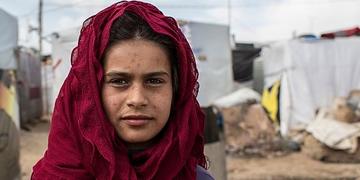
Economic Crisis Combined with COVID-19 Is Pushing Lebanon Towards a Hunger Crisis
August 4, 2021 will mark one year since a massive explosion in Beirut rocked Lebanon's capital city and caused catastrophic damage. Amid a steady decline of the country’s economy, the explosion could not have come at a worse time.��
Today, Lebanon is one of 20 "hunger hotspots" where����has warned acute food insecurity is likely to deteriorate over the coming months.��
What does the economic crisis in Lebanon mean for children now?
Growing unemployment and poverty, skyrocketing inflation rates and the COVID-19 pandemic have contributed to a deterioration of food security for children and families. For example:��
- More than 30% of families had at least one child who skipped a meal or went to bed hungry in March 2021.
- 77% of households said they did not have enough food or enough money to buy food.��
- For Syrian households, the figure was a staggering 99% of households said they did not have enough food to eat or money to buy food.��
- One in five households did not have enough drinking water.
- Children with disabilities are often at even higher risk of food insecurity.��
The dire economic situation, combined with pandemic-related lockdowns, has increased tensions and anxiety within many households. As evidenced by multiple recent , the ongoing economic crisis in Lebanon is having a serious impact on children’s development, protection and wellbeing in the following ways:
- 30% of children are not receiving the primary health care they need.
- One in ten children has been sent to work.
- 15% of families stopped their children’s education.��
��
What does the economic crisis in Lebanon mean for children in the future?
With parents in Lebanon struggling to put food on the table, rates of child labor and child marriage are already on the rise.��
Working children who are food-insecure are more likely to experience delays in growth in height and weight, and experience chronic malnutrition, acute malnutrition and anaemia.
They are also at higher risk of injury and diseases such as asthma and mental health issues.
Food insecurity also leads to children dropping out of school or not enrolling at all since they are likely to be the main breadwinner of the family. More girls face the risk of being deprived of the opportunity to attend school during the crisis.
Urgent action is required to prevent child malnutrition in Lebanon.
While the economic crisis in Lebanon continues to escalate, the child malnutrition crisis is preventable.��
Protecting children from the impact of poverty is one of the most economically and socially sound investments that Lebanon can make to support the development and economic stability of the country.
��ɫ��Ƶis providing families with assistance to ensure families not only meet the survival needs of their children, but can also afford other basic services to ensure the wellbeing of their children.��
Your donation to the can help support the urgent needs of children and families.


